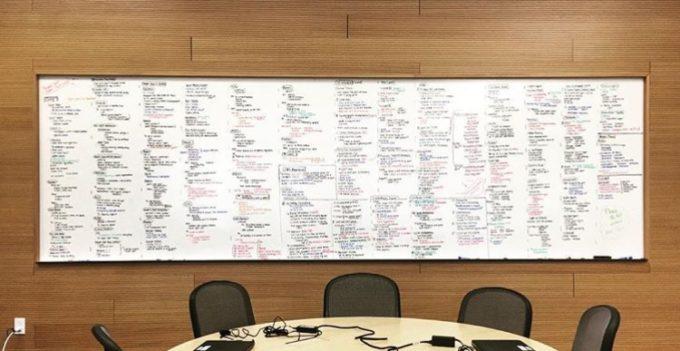
Get the latest articles delivered directly to your inbox!
Our Contributors
Class of 2022
Kyle Duke
Austin Foster
Charlotte Leblang
Ross Lordo
Class of 2021
Dory Askins
Connor Brunson
Keiko Cooley
Mason Jackson
Class of 2020
Megan Angermayer
Carrie Bailes
Leanne Brechtel
Hope Conrad
Alexis del Vecchio
Brantley Dick
Scott Farley
Irina Geiculescu
Alex Hartman
Zegilor Laney
Julia Moss
Josh Schammel
Raychel Simpson
Teodora Stoikov
Anna Tarasidis
Class of 2019
Michael Alexander
Caitlin Li
Ben Snyder
Class of 2018
Alyssa Adkins
Tee Griscom
Stephen Hudson
Eleasa Hulon
Hannah Kline
Andrew Lee
Noah Smith
Crystal Sosa
Jeremiah White
Jessica Williams
Class of 2017
Carly Atwood
Laura Cook
Ben DeMarco
Rachel Nelson
Megan Epperson
Rachel Heidt
Tori Seigler
Class of 2016
Shea Ray
Matt Eisenstat
Eric Fulmer
Geevan George
Maglin Halsey
Jennifer Reinovsky
Kyle Townsend
Join USCSOMG students on their journeys to becoming exceptional physician leaders.

Statistics
2.7%. It’s crazy to even think about that number. Almost 4,000 applicants. 300 some interviews. 105 spots. I sat there reflecting on this during our white coat ceremony a couple of months ago. Recently, a couple med school friends and I went out to grab a drink and coincidentally ran into some friends of friends. We talked about the weather, sports, and the other monotonous conversations that are legally required to happen when you meet someone for the first time. Then, right on cue, the conversation turned to careers. “So are you in school with so-and-so?” I uttered a simple yes, only to be immediately followed by “Wow you must be a genius, good for you man.” I awkwardly shook my head no and laughed while quickly returning the question. I got the simple response of “Oh, nothing too exciting, I’m a mechanical engineer and I develop racing tires, just some math and whatnot.” Are you kidding me? I took math the summer after my sophomore year at a college in my hometown since I would’ve most definitely been flirting with the line of failure had I taken it at my undergraduate institution. And here was a mathematical guru telling me I was the smart one? False sir, false.
Statistics have always fascinated me, while also making me a very skeptical person. There’s always something in the fine print about that #1 Steakhouse in the Country! Fine print: (as voted by our one frequent customer and no one else). Or the finding that donuts can actually be good for you!: (If you only eat a fraction of an unglazed donut once every month). The statistics of medical school are more or less the same, but our paths are the small print. Let me attempt to explain with a few of my own personal statistics that led me to become one of the 2.7% of students accepted.
18 – the number of months I worked as a patient care tech in between college and starting medical school, not by personal choice. While there were many, many, many positive takeaways from that job, which I could write an entire book about, spending a majority of my days assisting with cleaning and feeding wasn’t exactly the career path I had envisioned for someone who had high hopes and expectations of becoming a doctor.
4 – The number of points I dropped on my second MCAT. You know, the MCAT I was supposed to improve my score on in order to impress schools. The MCAT I put more time into. The MCAT I had high hopes for. The MCAT I was certain I did better on…
3 – The number of times I took the MCAT.
2 – The number of application cycles I went through. The lengthy, painstaking, and pricey applications. The hours and hours spent re-reading my personal statement, frequently cringing at the words I was writing. The several calls to the registrar office begging them to let me surpass the $10 fee to see what classes I paid to take in the years prior. The two separate interview days, where I thought every single person I passed was judging me on how I spoke, opened doors, walked up stairs, breathed in air, and everything else in between. The sitting. The waiting. And more sitting. And more waiting
1 – Acceptance letter.
I don’t consider myself a gambling man, but I’d be willing to bet that I’m not the only one in this boat. While all different, each person has their own set of statistics that can easily be looked at as failure. Times that can be glossed over as “tough times.” But I’m beginning to see that they are the exact opposite. Rather, these are the important statistics. The numbers and figures that make us who we are. The statistics that, at the end of the day, truly make up our foundation as an individual. I can guarantee you I will have a plethora of future “failures,” or hardships that seem to be nothing more than my inability to succeed. But they are the rungs of a ladder. The stairs of a staircase. Whatever metaphor you want to use for going up. These are the moments that really create us. While we are the 2.7% that ended up in the lecture hall at orientation a couple months ago, I think that one number is a terrible representation of who we really are. I think it’s important to embrace our failures, to lean on each other, and recognize that we are not perfect, but very far from it actually. But in that same breath, we are always moving up, whether it feels like it or not. It is okay to fail. Failure is the basis of learning, and it has been since we were born. So next time you feel inadequate, just know that you’re wrong. Remind yourself that the tough moment you’re experiencing is only contributing to your more than adequate-ness. And if you can’t remind yourself, I’ll remind you. Don’t ignore your statistics of hardship, embrace them. Give them purpose. And never give up.
I was born and mostly raised in Mount Pleasant, SC before attending Furman University (roll dins), getting a BS in neuroscience. I took a two-year hiatus from academia before returning to the Upstate to attend USCSOMG. I enjoy life, people, and Chick-Fil-A. I try not to take life too seriously, and find the silver lining no matter how thin it is. Caffeine is nice, I wish there were more Piggly Wiggly’s left, and I’m not great at writing bios.
Copyright 2021 USC School of Medicine Greenville


